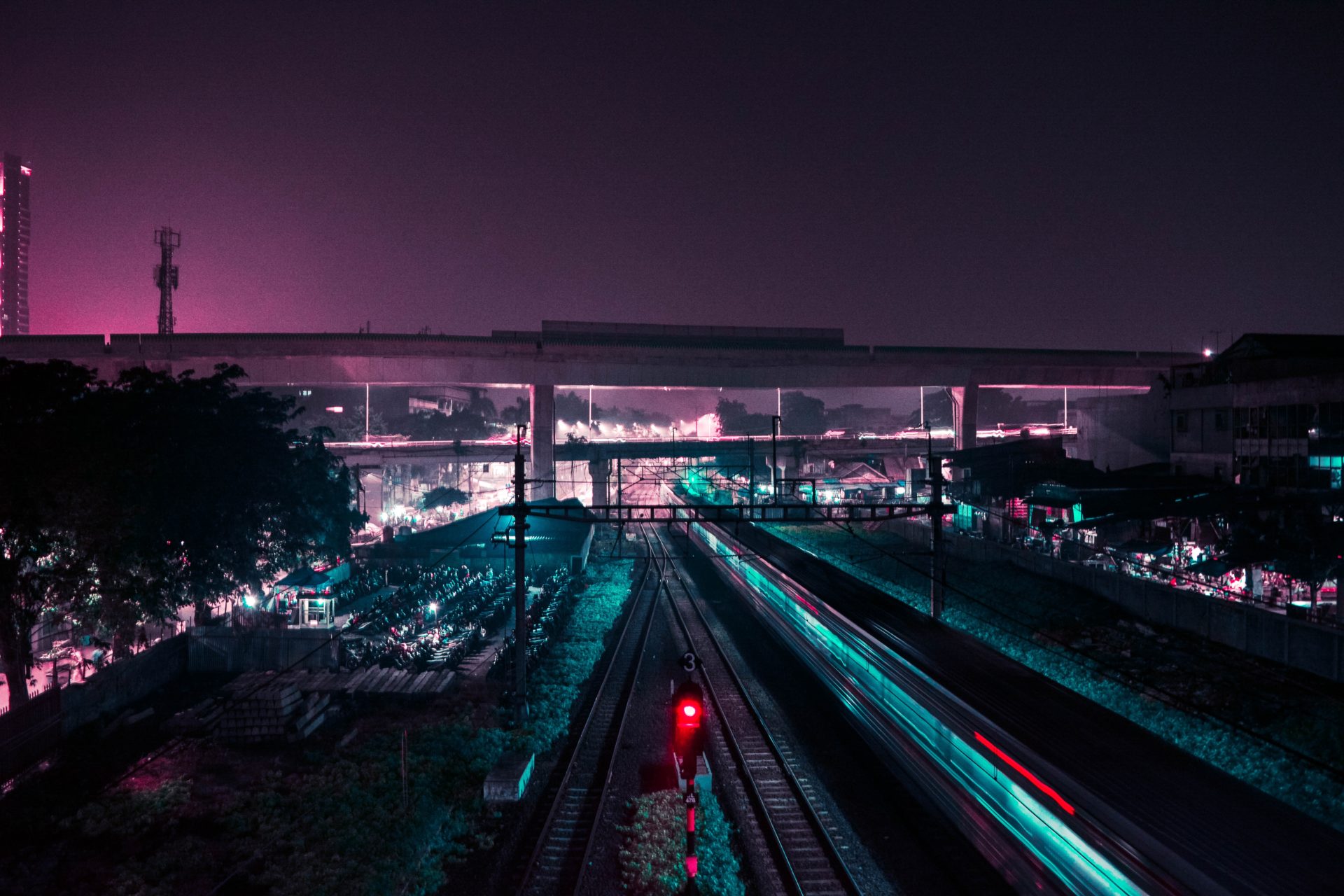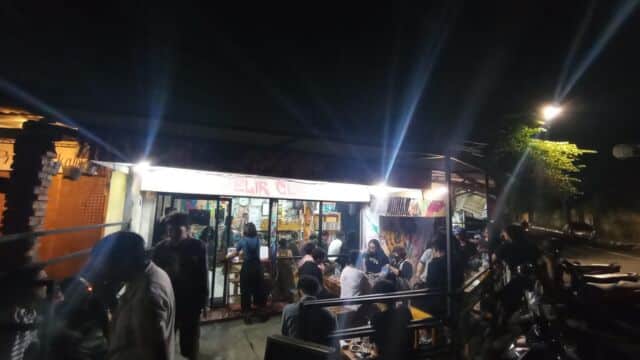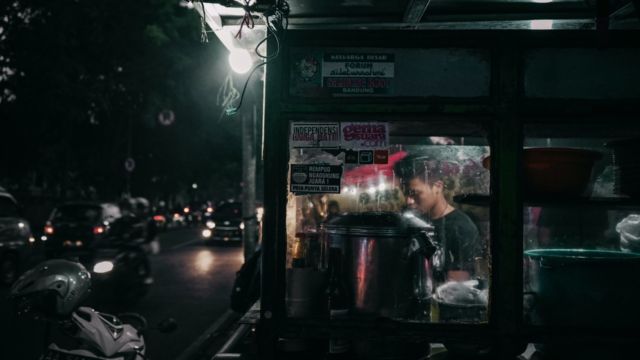What ‘Work from Anywhere’ (WFA) Means in Jakarta
Photo: Fahrul Razi/Unsplash
A suburban train | 2,500 words | Translated from Bahasa Indonesia by Sarah Leys
I close my laptop, ill-at-ease.
A video conference with the brand marketing division has ended only now, at 4:30pm, while I’m supposed to eat dinner with colleagues from my own creative production team. In Central Jakarta.
My office has applied a Work From Anywhere (WFA) policy during the pandemic, so I’ve worked from home. But the agreement has been that we should be ready to gather face-to-face occasionally for the sake of camaraderie.
I grab my jacket, mask, and shower cap to protect my hair whilst wearing the helmets of ojek motorbike taxis, and go to wait outside my house’s front terrace, having ordered by app an initial ojek ride to Tangerang Train Station.
I’m already imagining a spirit-crushing journey on the train. Masses pressed together. Forced to stand in the doorway of a full carriage, all but gasping for air. Staring vacantly through the window at the metropolis’s impoverished edges.
A coolish breeze rustles green leaves in a row of plants growing next to our house. A contrast with my state of mind that’s more and more unsettled – for I know it’s likely that, soon, we will be ordered back to the office. If that happens I’ll be taking the train every day and will, in the Jakarta expression, ‘grow old commuting’, accompanied by impatient, fretful thoughts – ‘gosh I want to get home’, ‘when will the weekend come’, ‘I want to be a couch-potato forever’.
Occasionally, though, I also think to myself… that the train has not merely been a transit zone for me, it’s also been my most loyal travelling companion. That the train is like the Anywhere Door in Doraemon, something I can use to go to places far and wide, and places new to me.
Yet nothing can beat the awesomeness of working from wherever you want, especially if it’s your own home. I can arrange my own schedule, maximise my break times, and eat lunch with my mum. I can, if I’m stressing out staring at the screen, go outside for a minute and give food to the cats of the residential complex. Fittingly, I now see a calico cat who’s a regular at those feeding sessions walking towards me from another housing block: I smile in greeting.
In the distance I hear loud laughter from a group of little kids playing chasey. A sound so innocent it gives me a momentary feeling of tranquility. A thought pops into my head: any future system of work should enable everyone to become the ‘boss’ of their own personal productivity. Not everything should be made uniform: all people have their own ways of being comfortable and of working best.
My meditations are cut short by the motorbike taxi driver pulling up outside the house. He hands me a helmet and double-checks the destination: ‘Mbak Vero? Tangerang Station, yeah? D’you want a rain poncho now or wait til later?
I look at the sky – quite overcast, but the distance we’ll travel isn’t far, only about five kilometres.
‘Let’s just hit the road, Mas, seems it’s not coming down yet’, I answer quickly.
The bike begins cleaving a path through the traffic.
*
Throughout the motorbike journey vehicle noise, shrill and insistent, mixes with the yells of the men staffing the dilapidated angkot minibuses filling the road. It’s the peak hour rush, so a lot of enormous Metro Mini buses are parked on a road shoulder beside a shoe factory, backing everything up. I shake my head several times at the motorbikes weaving, dodging, and overtaking, trying to defy the traffic jam. Many fail, but others get somewhere, my own ojek driver among them.
We arrive at Anyar Market, very close to the train station. A line of shophouses is selling electronics, wholesale clothes, and essential foodstuffs like rice. From one clothing shop two young salesmen are bellowing through a speaker system about discounts:
‘Come on ladies! Baby clothes half-price, only today!’
‘Only today, ladies. All types of clothing, crazy discounts!’
The street’s more and more filled with people, flooding this way and that, chasing the sales. This road had seemed wide, but suddenly feels claustophically narrow from the overspilling crowds – my motorbike’s compelled to slow. I’m not even inside the station and I already feel like I’m on a battlefield.
Although, a part of me is relieved to see all this. The pandemic laid waste to the economy of this country. Now I’m seeing it pulsing and beating again, slowly returning to life.
The train window frames the life of the big city out there, a life glittering but also filled with people with sharp elbows. Those travelling aboard the trains, especially workers like me, are reminded to continue working to the bone and racking our brains, to avoid being smashed apart by economic conditions. We can be inside the train carriage or we can be outside it, beside the tracks.
Getting down from the bike I have to walk a little to reach the station entrance. Motorbike taxis and angkots are all around trying their luck, hoping to snaffle homecoming workers exiting the station or visitors coming to try the culinary delights of Tangerang – this area immediately around Tangerang Station is renowned for food. Slightly out of breath, I pass through the station entrance gate. I tighten the cord of my hoodie, in anticipation of the train’s AC and to keep dust and dirt off my skin – ready for the real journey to begin.
*
Scanning my ticket at the fare gate, I hear an announcement. A train to Duri arrives in less than five minutes. People around me go into a panic. In droves they all but invade the place – after first showing officials their vaccination status. Mothers with children, men with large backpacks, likely going to hawk wares at night markets in the capital, and teenagers with buds in their ears. Fittingly, since this crowd is headed to rather than from Jakarta in the late afternoon, only a few people, wearing neatly-buttoned shirts, look like office-workers – maybe the night-shift, I think.
I follow on the crowd’s tail towards the platform, smelling the wonderful aroma of the sweet buns which are almost always sold in Indonesian train stations and which can be very useful for filling your belly before or after travels: my favourite is the butter-filled coffee bun. I ‘pass’ the vaccination-status check, and walk towards the end of the platform. The train’s not here yet but people are already jostling behind the yellow line, preparing to lunge for a seat.
I face a dilemma. I already miss home. The sky above is now darkening. If only I didn’t have to go out, I think: I could be sprawled on the couch with a novel now. But if I don’t meet my work colleagues today, when will I? In over a year, I’ve never actually greeted and chatted to them face-to-face.
Amid my conflicted state of mind a train hoots, startling me. A ten-carriage train, coming from Jakarta, clatters onto the platform. It slows down as it passes me, the windows revealing passengers inside packed like sardines. Most are office-workers en route home. They look exhausted.
In this moment, I think: people’s real situations become clear when they’re riding a train. Especially the urban workforce. Yes, trendy clothes, but now looking a little dishevelled. Not just the smell of perfume, but now sweat, too. All from the sheer length of their journey, an invisible burden that can’t be seen on their shoulders, keeping a set of dreams entrapped and unrealised in their minds. For me, all of this is not just about ‘work’, but about enduring. I see myself in them.
The train comes to a halt. The carriage-door opens. People stream out – people who are out of patience. The train will now rollick back toward Jakarta. I step inside.
*
I’m in the women-only carriage. Here I can breathe easier: even if it gets crowded, I won’t need to worry about sexual harassment.
In the late afternoons this carriage is quieter than the regular mixed-gender carriages. Also, the women-only carriage, because it’s usually right on the end of the train, tends to directly face the driver’s booth, something I find enjoyable because I can freely observe the train driver at work behind the all-glass divider.
Standing up, I lean against the wall, close to the door, when out of the blue a middle-aged woman who’s seated says: ‘Just sit here, it’s still empty’. Patting the bench next to her, her eyes glancing left and right, she then says, more slowly, half-whispering: ‘there’s no officer’.
It’s very rare for any train passenger to be friendly and offer a seat to a young person like me. Maybe this lady doesn’t feel right to see someone standing close by when there’s an empty seat right beside her. I appreciate the gesture, yet I shake my head in polite refusal. ‘No thank you, Bu. Because there’s already five people’. Since the pandemic the long train benches, usually crammed full, are only allowed to seat five people, though people ignore the rule if no official is around.
Drrrttt…drrrt. My phone’s vibrating. A message from a colleague in another division, asking for assistance to prepare an advertisement script. And an email inviting me to a meeting tomorrow morning to discuss a new campaign.
I have to answer every message. Short bursts of work, completed on a handphone aboard a train. Even when I’m on the move there’s a deadline in hot pursuit, right up until I disembark. Without mercy, without listening to reason. At moments like this I feel that ‘corporate slave’ is a very real thing.
After assisting with several work bits and pieces I can put my phone away again. My eyes feel tired after a day looking at a screen. I return my attention to the driver behind the glass. When I do so, I can see everything the driver sees, a view that’s much wider because the driver’s booth has open glass to the left and the right and in front.
Crowded streets are the most common scenery as the train moves through the Tangerang area. But things change when we leave Poris Station and head towards Rawa Buaya Station, which is now within the official municipal boundaries of Jakarta.
Dilapidated houses appear, their walls all but falling apart. Rows of them stand frail on the edge of the train track, and I become convinced they would crumble entirely in any sort of disaster. From these houses little kids sometimes appear, to chase a chicken or a kampung cat on super-narrow pieces of land. Middle-aged women I see pouring chocolate-coloured water from buckets where they have just washed clothes.
This scenery is more and more the norm as the train stops in Kalideres, Bojong Indah, up to Taman Kota Stations. The sky turning to night, and a drizzle falling, makes the dwellings look haunted to me.
My thoughts wander. Perhaps this train has two functions rather than one. As well as taking me to work to earn a living or bringing me to meet friends or family, it also allows me to get out and see another aspect of the city, to glimpse it from a different perspective, one that’s usually hidden from me. A side that’s not always beautiful, that’s often dark – a side that’s been easy to forget during the pandemic, when I didn’t have to leave the house and see it with my own eyes. Heart-breaking.
The train window frames the life of the big city out there, a life glittering but also filled with people with sharp elbows. Those travelling aboard the trains, especially workers like me, are reminded to continue working to the bone and racking our brains, to avoid being smashed apart by economic conditions. We can be inside the train carriage or we can be outside it, beside the tracks. Assistance would then come only with election-campaigns, when political parties hand out trivial freebies.
I clench my hand into a fist and close my eyes. What I think is: we’re in a system that forces us into so many roles to keep going that we forget who we are, and forget how to be happy.
My phone vibrates again. This time a notification from my colleagues, asking if I’m close. Not far away, already in Grogol, I reply, typing fast. I glance again to the window. The drizzle has become rain so the night feels even darker.
I only now become aware I’ve been almost half an hour on this train. And after this, I’ll need to order another motorbike taxi to get to the restaurant. I take a breath. This is going to be a long day.
*
The dinner with colleagues finishes at about eight o’clock. To go home I take the train from Sudirman to Duri Stations, change lines, then ride back to Tangerang. The women’s carriage is quieter than the regular carriages – I can even sit down without fighting for a spot.
In the carriage are quite a lot of people around my age bracket, from 25-ish to their early 30s. Middle-aged women are present, but not as many as during the afternoon, and they don’t have children with them now. Most people are visibly tired, occasionally closing their eyes and resting their heads on the back of the seats or against the vertical rails.

Throughout the journey back, I chew over my chat with my colleagues in the restaurant. Actually, it was fun meeting them. I not only could joke around with them, but also complain about the online work requests that constantly arrive: it felt good to meet people suffering similar fates.
It seems that, deep down, I think face-to-face meetings are needed to build and maintain relations in ways that can’t be done on-screen. Even though for me the cost is severe, a prolonged struggle of a journey.
One of our managers had told us there was a possibility we would fully go back to the office soon. But we discussed the option of hybrid too.
‘Ugh! Why should we come in?’ said one senior.
‘If we can come in intermittently in shifts, once or twice a week, is that possible?’ said another colleague. I nodded vigorously at that proposal.
I have to say I will mind quite a lot if I’m forced to become a commuter every day. Just imagining waking up at dawn to catch a train makes me feel tired. Harassed in the office by deadlines and targets, then upon going home having to fight for a place in a carriage. It all sounds horrific to me, at least if it’s done so often as to become routine.
However, neither is it possible to lock myself away without meeting other colleagues. And chatting face-to-face, without my eyes getting sore from staring at a screen of interlocutors, it turns out has really fired me up.
Tonight, my wish to work fully from home changed into a small kernel of agreement inside me that a hybrid model is the most effective middle path. As if reading my thoughts, the manager had finally said: ‘Yeah, I’m going to propose a hybrid system to the highers-up. Maybe also it will be good if there are times where we don’t just meet in the office, but also in a café for a change of atmosphere’.
I snap back from my thoughts only when the train stops.
Officers are going through each carriage, waking up passengers who have fallen asleep and telling them that the train is already at the final station.
It’s going on past nine o’clock. The night sky is now really truly black. But the station is lit-up. People are streaming past and entering the now-emptied carriage as I step out. Motorbike taxis and becak, cycle rickshaws, are waiting for passengers outside. The lights from the clothes-shops opposite the station are burning bright, far more so than the dim lights of passing cars. I exit the station while ordering an ojek on my phone. Then I glance backwards.
The train is still parked, waiting for all passengers to enter before it turns back to Jakarta. As if without fatigue, as if without complaint. Because it knows how many people, especially workers, depend on it for their mobility. I purse my lips, smile softly. Until we meet again, thank you for today.
© Veronica Gabriella
English translation © Sarah Leys






